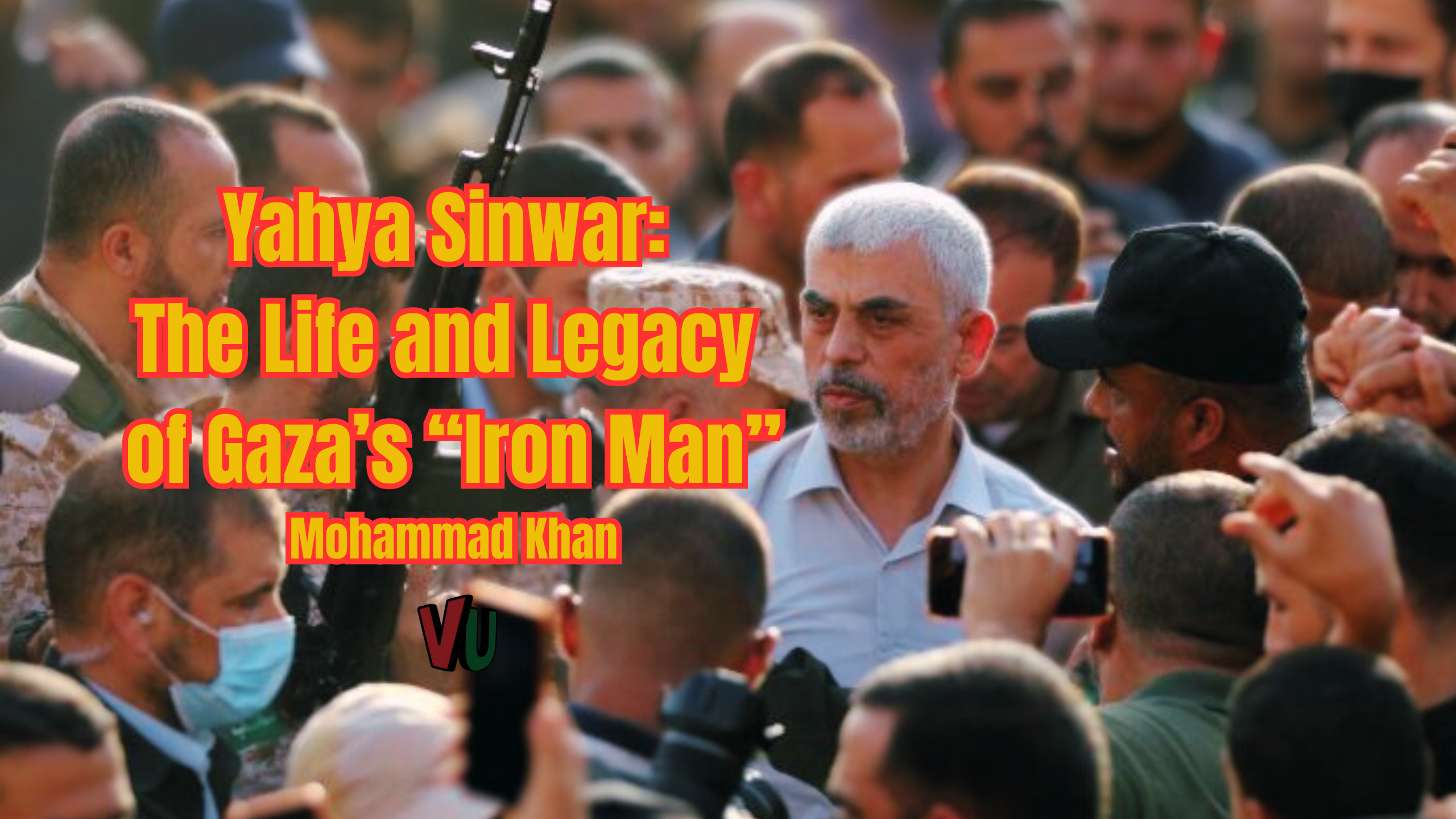
Mohammad Khan
Yahya Ibrahim Hassan Sinwar — known to many as Abu Ibrahim — was martyred in combat in the southern Gaza city of Rafah. For Palestinians, his death marked not only the loss of Hamas’s top leader but the symbolic closing of a generational chapter in Gaza’s long history of resistance and suffering. Sinwar’s life —from refugee to political prisoner to leader of one of the most influential Palestinian movements —is an embodiment of the trajectory of a people defined by displacement, defiance, and enduring struggle.
Born in 1962 in the Khan Younis refugee camp in the southern Gaza Strip, Sinwar was the son of Palestinian parents expelled from the coastal city of Majdal Asqalan — renamed Ashkelon after its capture by Zionist militias in 1948. Like hundreds of thousands of Palestinians who fled or were expelled during the Nakba, his family found refuge in the overcrowded camps of Gaza, where they lived under conditions of scarcity and humiliation.
In his autobiographical novel The Thorn and the Carnation, written years later while in an Israeli prison, Sinwar reflected on the deprivation of his childhood — the meager UN rations, the worn-out clothes, and the narrow, windowless shelters that housed entire families. This early environment of exile, poverty, and collective trauma forged Sinwar’s worldview and his lifelong dedication to resistance.
Sinwar’s political consciousness sharpened during his studies at the Islamic University of Gaza, where he earned a degree in Arabic literature. There, he helped establish the Islamic Bloc, the student movement that would evolve into the nucleus of Hamas. His activism quickly drew the attention of Israeli authorities, who arrested him for the first time in 1982.
Following multiple detentions, Sinwar became close to Sheikh Ahmed Yassin, who would later found Hamas in 1987. That same year, Sinwar co-founded Majd (Organization of Jihad and Preaching), a Hamas security apparatus tasked with identifying and punishing Palestinians accused of collaborating with Israel. To Israeli intelligence, Majd represented a new and ruthless face of Palestinian militancy; to Sinwar and his followers, it was a necessary tool of survival under occupation.
In 1988, as the First Intifada intensified, Sinwar was arrested again and sentenced to four life terms for the killing of two Israeli soldiers and four alleged Palestinian collaborators. He was 26 years old.
Sinwar would spend the next 22 years in Israeli prisons, emerging as one of the most influential figures among Palestinian detainees. Imprisonment did not silence him — it transformed him. He learned Hebrew, studied Israeli society and politics, and developed a reputation for both discipline and ideological rigidity.
It was also in prison that Sinwar began to write. The Thorn and the Carnation, smuggled out in fragments with the help of fellow prisoners, was published in 2004 and remains his most personal testament. Through its protagonist, Ahmed, a refugee child growing up under occupation, Sinwar offered a rare literary window into the psychological and moral universe of Gaza’s resistance generation. His second book, Glory (2010), chronicled Israeli assassinations of Palestinian leaders.
In 2011, after 23 years behind bars, Sinwar was released in the Gilad Shalit prisoner exchange — one of over a thousand Palestinians freed in return for a single captured Israeli soldier. For many Gazans, his return was celebrated as the resurrection of a man who had endured decades of confinement without compromise.
Following his release, Sinwar reentered public life swiftly. In 2012, he was elected to Hamas’s political bureau and assumed a senior role overseeing the group’s military wing, the Izz al-Din al-Qassam Brigades. By 2017, he rose to become Hamas’s chief in Gaza, succeeding Ismail Haniyeh, who later became the movement’s overall political leader.
Unlike Haniyeh, who operated from abroad, Sinwar remained in Gaza, cultivating an image of an ascetic, hardened commander — a man of few words and unshakable resolve. His leadership combined political pragmatism with military conviction: he oversaw reconciliation efforts with Fatah and the Palestinian Authority while simultaneously preparing for confrontation with Israel.
During the Great March of Return protests of 2018 and 2019, Sinwar expressed admiration for the peaceful demonstrations at the Gaza border, which demanded an end to Israel’s blockade and the right of return for refugees. Yet when Israeli snipers killed more than 200 protesters, Sinwar reaffirmed that armed resistance remained, in his view, the only language Israel understood.
Sinwar’s role in shaping Hamas’s strategy came into sharp focus on October 7, 2023, when the al-Qassam Brigades launched Operation al-Aqsa Flood. Israel and its allies branded Sinwar the “mastermind” behind the assault, which triggered Israel’s devastating campaign in Gaza — a genocide that has since killed tens of thousands of Palestinians.
For many Palestinians, he was the steadfast symbol of defiance against overwhelming military force. Western intelligence reports described him as calculating and ruthless; his supporters called him the “Iron Man” — a title earned not only for his toughness but for his refusal to flee or surrender.
Despite repeated Israeli claims that he was hiding underground, Sinwar was ultimately killed by the Occupation in open combat. The image of the 62-year-old leader dying on the frontlines reinforced his mythic status among supporters who saw his death as proof that he lived — and died — as a fighter among his people.
Sinwar’s death marked a turning point for Hamas and for Gaza. Within hours of the announcement, Hamas vowed to continue his path “until the liberation of Palestine with Jerusalem as its capital.” For many Palestinians, Sinwar’s life represents more than militant defiance — it embodies the continuity of a national struggle passed down through generations since 1948.
From the alleys of Khan Younis camp to the prisons of Israel and the battlefields of Gaza, Yahya Sinwar’s story mirrors that of his homeland — scarred, unyielding, and still searching for freedom. His life remains inseparable from the tragedy and resilience of the Palestinian people.
Mohammad Khan is an activist in Dallas, Texas. He has a BA in History and is passionate about social justice.